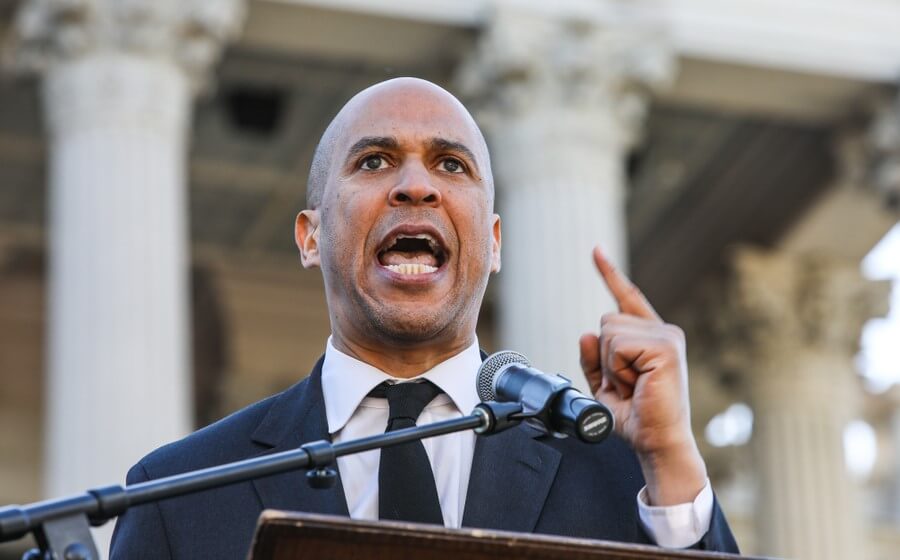With the field of Democratic hopefuls hitting 20 today with Joe Biden announcing his intentions, the candidates are trying to separate themselves from the pack with unique policy proposals and Cory Booker is the latest, proposing a $1,000 “baby bond” for all U.S. newborns.
The baby bond proposal has quickly become the centerpiece of the New Jersey Senator’s campaign, and he says it would help Americans, and black Americans in particular, raise their median wealth and combat income inequality.
The program would provide every baby born in the U.S. with a $1,000 savings account. There is no mention whether babies born from parents in the U.S. illegally also would be afforded such a windfall.
The government (taxpayers) would automatically deposit up to another $2,000 into that account each year, depending on family income. So minors in low-income families would get a larger chunk of that $2,000 maximum.
The funds would be locked into the savings account until the person hits 18 years old, and uses for the money would be limited to paying for college, buying a house or saving for retirement.
A wealth tax on the richest Americans would pay for Booker’s program proposal, which would cost about $60 billion a year.
The U.S. Treasury Department would manage the accounts and pay out a nice 3% annual return rate, according to a report by CNBC.
Analysis says Booker’s proposal would raise the median wealth among young black Americans from $2,900 to $57,845, and young white Americans would see their median wealth rise from $46,000 to $79,159.
CNBC also notes that wealth gap between the haves and the have-nots has only gotten worse.
Since 1983, median income for white families overall was $105,369 compared to $13,324 for black families. By 2016, the gap widened to $171,000 for white families and $17,409 for black families.
The average white family today has $157,884 saved for retirement, and the average black family has just $25,212 in retirement savings.
Per CNBC:
Booker calls his proposal, “the most ambitious ever Congressional effort to combat wealth inequality.” The average payment to black children under his plan would be $1,193 a year, compared with $628 for white children.
In a recent analysis of a baby bonds program, Naomi Zewde, a postdoctoral research scientist at the Center on Poverty and Social Policy at Columbia University, concludes it would “considerably narrow wealth inequalities by race.”
“Income inequality is pretty stark, but asset inequality is unbelievable,” Zewde said. “The baby bonds idea addresses that by bringing up the bottom.”
The program would cost $60 billion a year. Booker says it would be funded by increasing taxes on the richest Americans.
He would restore the estate tax exemption to its 2009 level of $3.5 million per person, which would expand the number of households subject to the levy. Currently, the exemption is $11.4 million per person. He would repeal the so-called step-up in basis at death, which means heirs could be on the hook for higher taxes if they sell inherited assets. And he would add another tax on the largest estates.
“Booker’s proposal is sensible in that the infrastructure for the tax exists, the legal change is pretty simple, and it would still leave us with an estate tax affecting rather few,” said Edward J. McCaffery, a scholar at the University of Southern California.
The idea that a savings account should be an American birthright is not entirely new. During the 2008 presidential election, then-candidate Hillary Clinton proposed providing newborns with a $5,000 payment that they could later use for college or a house.
Booker’s proposal already has critics.
“It’s clearly lovely to think about serving up every kid with some money at birth, but it’s not the role of the government,” said Veronique de Rugy, a senior research fellow at the Mercatus Center at George Mason University.
Daniel Hemel, a law professor at the University of Chicago, worries the relief would arrive too late in life for most struggling Americans.
“If I were to spend $60 billion a year addressing poverty and inequality, I would want some or all of it to go toward addressing child poverty,” Hemel said. “Booker is instead using that money to address the needs of adults who were once children in low- or middle-income families.”
The consequences of poverty on children, Hemel said, are lifelong. “Let’s address those problems early in life rather than later down the road.”
[totalpoll id=”10311″]
